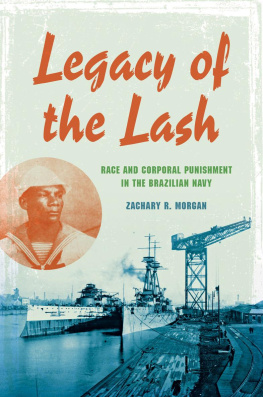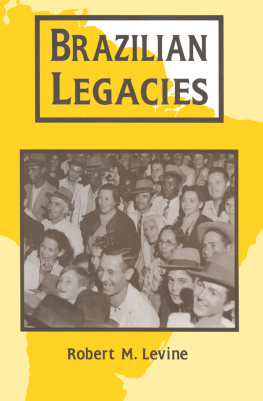Zachary R. Morgan - Legacy of the Lash: Race and Corporal Punishment in the Brazilian Navy and the Atlantic World
Here you can read online Zachary R. Morgan - Legacy of the Lash: Race and Corporal Punishment in the Brazilian Navy and the Atlantic World full text of the book (entire story) in english for free. Download pdf and epub, get meaning, cover and reviews about this ebook. City: Bloomington, year: 2014, publisher: Indiana University Press, genre: Politics. Description of the work, (preface) as well as reviews are available. Best literature library LitArk.com created for fans of good reading and offers a wide selection of genres:
Romance novel
Science fiction
Adventure
Detective
Science
History
Home and family
Prose
Art
Politics
Computer
Non-fiction
Religion
Business
Children
Humor
Choose a favorite category and find really read worthwhile books. Enjoy immersion in the world of imagination, feel the emotions of the characters or learn something new for yourself, make an fascinating discovery.
- Book:Legacy of the Lash: Race and Corporal Punishment in the Brazilian Navy and the Atlantic World
- Author:
- Publisher:Indiana University Press
- Genre:
- Year:2014
- City:Bloomington
- Rating:3 / 5
- Favourites:Add to favourites
- Your mark:
Legacy of the Lash: Race and Corporal Punishment in the Brazilian Navy and the Atlantic World: summary, description and annotation
We offer to read an annotation, description, summary or preface (depends on what the author of the book "Legacy of the Lash: Race and Corporal Punishment in the Brazilian Navy and the Atlantic World" wrote himself). If you haven't found the necessary information about the book — write in the comments, we will try to find it.
Legacy of the Lash is a compelling social and cultural history of the Brazilian navy in the decades preceding and immediately following the 1888 abolition of slavery in Brazil. Focusing on non-elite, mostly black enlisted men and the oppressive labor regimes under which they struggled, the book is an examination of the four-day Revolta da Chibata (Revolt of the Lash) of November 1910, during which nearly half of Rio de Janeiros enlisted men rebelled against the use of corporal punishment in the navy. These men seized four new, powerful warships, turned their guns on Rio de Janeiro, Brazils capital city, and held its population hostage until the government abolished the use of the lash as a means of military discipline. Although the revolt succeeded, the men involved paid dearly for their actions. This event provides a clear lens through which to examine racial identity, violence, masculinity, citizenship, modernity, and the construction of the Brazilian nation.
Offering new insights into the spectacular sailors revolt of 1910, Zachary R. Morgan treats the deep structure of Brazilian naval discipline, one based primarily on flogging. Slavery was only abolished in 1888, and the mutineers, largely of African descent, saw flogging as an intolerable holdover from the slave era. Morgan also shows the incompatibility of the old labor regime and modern naval technology. Trained on the new battleships in the English shipyards where they were built, Brazilian sailors increasingly viewed themselves as citizens in uniform. Joseph L. Love, University of Illinois, Urbana-Champaign
Legacy of the Lash is a stellar contribution to the growing global scholarship on mutiny and maritime radicalism. Zachary R. Morgan brings back to vibrant life the history-making powers of Brazils motley crews in the early twentieth century. Marcus Rediker, author of The Slave Ship: A Human History
Zachary R. Morgan: author's other books
Who wrote Legacy of the Lash: Race and Corporal Punishment in the Brazilian Navy and the Atlantic World? Find out the surname, the name of the author of the book and a list of all author's works by series.












 The paper used in this publication meets the minimum requirements of the American National Standard for Information Sciences Permanence of Paper for Printed Library Materials, ANSI Z39.48 1992.
The paper used in this publication meets the minimum requirements of the American National Standard for Information Sciences Permanence of Paper for Printed Library Materials, ANSI Z39.48 1992.